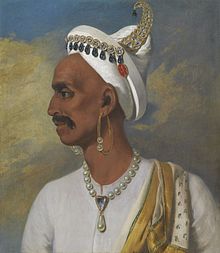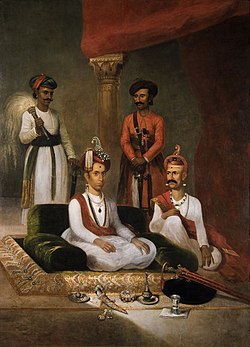| Nana Fadnavis | |
|---|---|
 Portrait of Nana Fadnavis by John Thomas Seton | |
| Born | Balaji Janardan Bhanu 12 February 1742 Satara, Maratha Empire (Modern-day Maharashtra, India) |
| Died | 13 March 1800 (aged 58) Pune, Maratha Empire (Modern day Maharashtra, India) |
| Religion | Hinduism |
| Occupation | Prominent minister and statesman of the Maratha Empire during the Peshwa administration |
Nana Fadnavis (Pronunciation: [naːna pʰəɖɳəʋiːs, fəɖ-]; also Phadnavis and Furnuwees and abbreviated as Phadnis) (12 February 1742[citation needed] – 13 March 1800), born Balaji Janardan Bhanu, was a Maratha minister and statesman during the Peshwa administration in Pune, India. James Grant Duff states that he was called "the Maratha Machiavelli" by the Europeans.[1]
Balaji Janardan Bhanu was born in a Chitpavan Brahmin family in Satara in 1742 and was nicknamed 'Nana'. His grandfather Balaji Mahadaji Bhanu had migrated from a village called Velas near Shrivardhan during the days of the First Peshwa Balaji Vishwanath Bhat. The Bhats and the Bhanus had family relations and a very good friendship existed between them. The two families had respectively inherited the 'Mahajan' or village-head positions of the towns of Velas and Shrivardhan. Balaji Mahadji had once saved the Peshwa from a murderous plot by the Mughals. The Peshwa therefore recommended Chattrapati Shahu to award the title of Phadnavis (one of the Ashtapradhan) on Bhanu. Later, when the Peshwa became the de facto head of state, Phadnavis became the main minister who held key portfolios of Administration and Finance for the Maratha Empire during the Peshwa regime.[citation needed]
Nana was the grandson of Balaji Mahadji Bhanu and had inherited his grandfather's name, keeping up with the tradition. The Peshwa treated him like family and extended to him the same facilities of education and diplomatic training as his sons, Vishwasrao, Madhavrao, and Narayanrao. He continued to be the Phadnavis, or the finance minister, for the Peshwa.[citation needed]

In 1761, Nana escaped to Pune from the Third Battle of Panipat and rose to great heights, becoming a leading personage directing the affairs of the Maratha Confederacy, although he was never a soldier himself. This was a period of political instability as one Peshwa was rapidly succeeded by another, and there were many controversial transfers of power. Nana Phadnavis played a pivotal role in holding the Maratha Confederacy together in the midst of internal dissension and the growing power of the British East India Company.[citation needed]

Nana's administrative, diplomatic, and financial skills brought prosperity to the Maratha Empire and his management of external affairs kept the Maratha Empire away from the thrust of the British East India Company. He displayed his best warfare skills in various battles won by Maratha forces against the Nizam of Hyderabad, Hyder Ali and Tipu Sultan of Mysore, and the English Army.[citation needed] However, Nana's policy of fighting the Mysoreans, forming a confederation against Tipu Sultan in the Third Anglo-Mysore War with Hyderabad and the British, weakened Tipu Sultan, whose advanced armies had at that point been the bulwark against British control. Furthermore, his policy of remaining neutral in the Fourth Anglo-Mysore War, between the British and Tipu Sultan, weakened support for the latter, paving the way for British dominance in the Indian subcontinent. On hearing of the death of Tipu, Nana remarked that the Marathas had only now realized that they were next, and there was "no escape from [this] destiny".[2]
After the assassination of Peshwa Narayanrao in 1773, Nana Phadnavis managed the affairs of the state with the help of a twelve-member regency council known as the Barabhai council. The council was Nana's mastermind plan to protect Madhavrao II, son of Narayanrao, born posthumously to Gangabai, the widow of Narayanrao, from the Peshwa family's internal conflicts. The Barabhai Council was an alliance of influential Sardars (generals) led by Nana. Other members of the council were Haripant Phadke, Moroba Phadnis, Sakaram Bapu Bokil, Trimbakraomama Pethe, Mahadji Shinde, Tukojirao Holkar, Phaltankar, Bhagwanrao Pratinidhi, Maloji Ghorpade, Sardar Raste, and Babuji Naik. During this time, the Maratha Empire was significant in size with a number of vassal states under a treaty of protection who recognized the Peshwa as the supreme power.[citation needed]

While visiting Daulat Rao Sindhia's camp one day in 1798, Nana was suddenly imprisoned, leading to unprecedented looting and anarchy in Pune. He was released a few months later. After a short illness, Nana died at Pune on 13 March 1800. Following his death, Peshwa Baji Rao II placed himself in the hands of the British, provoking the Second Anglo-Maratha War that began the breakup of the Maratha confederacy.[citation needed]